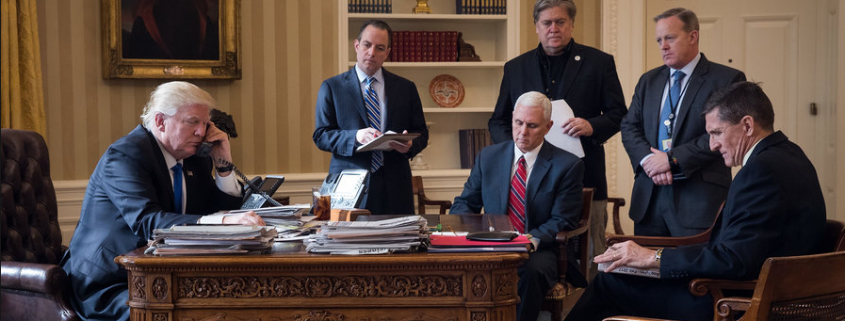The WaPo has another big story, this one reporting that the Trump Administration attempted to prevent Sally Yates from testifying about her warnings to the Trump Administration that Mike Flynn had had conversations about sanctions with Russian Ambassador Sergey Kislyak.
Scott Schools, another Justice Department official, replied in a letter the following day, saying the conversations with the White House “are likely covered by the presidential communications privilege and possibly the deliberative process privilege. The president owns those privileges. Therefore, to the extent Ms. Yates needs consent to disclose the details of those communications to [the intelligence panel], she needs to consult with the White House. She need not obtain separate consent from the department.’’
Yates’s attorney then sent a letter Friday to McGahn, the White House lawyer, saying that any claim of privilege “has been waived as a result of the multiple public comments of current senior White House officials describing the January 2017 communications. Nevertheless, I am advising the White House of Ms. Yates’ intention to provide information.’’
That same day, Nunes, the panel’s chairman, said he would not go forward with the public hearing that was to feature Yates’s testimony.
In response to the story, Adam Schiff suggested Yates might have testified about why Trump waited before firing Flynn.
[W]e would urge that the open hearing be rescheduled without further delay and that Ms. Yates be permitted to testify freely and openly so that the public may understand, among other matters, when the President was informed that his national security advisor had misled the Vice President and through him, the country, and why the President waited as long as he did to fire Mr. Flynn.
According to the WaPo, Yates informed Don McGahn that Flynn was lying about his calls, making him susceptible to blackmail, on January 26. She was fired on January 31. Flynn tried to lie about the conversation again on February 8. Then, as the WaPo was reporting this story, he altered his story. Nevertheless, it wasn’t until the WaPo reported on Yates’ warning, on February 13, that Trump forced Flynn to resign.
Two days after Yates’ warning, January 28, Trump spent an hour on the phone with Vladimir Putin, with Flynn (and Pence) in attendance.
So one of the things that Trump enabled by stalling on his response to Sally Yates was that phone call.
In any case, the claim that Yates’ conversations with McGahn should be covered by Executive Privilege is a stretch. Just by way of precedent, in 2007, Jim Comey testified about his conversations with White House Counsel Alberto Gonzales while serving as Acting Attorney General.
That is, Yates’ conversation should not be covered by Executive Privilege unless Trump is claiming he was involved in hiding this information from Mike Pence.
